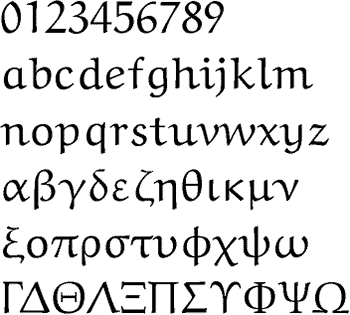
Source: Euler typeface glyphs, Mangus Back, Wikimedia
Why bother with Latin or Greek? Very few of you will become Latin or Greek scholars. The Latin that dominated communication in Europe for well over fifteen hundred years is a dead language. The Greek language, while important to modern day Greeks, has little international influence. However, learning some of the roots and affixes of these once prominent languages can be very useful because of the borrowing principle. Languages borrow heavily from each other, and English is no exception. In fact, English speakers found Latin words so useful that they reused them multiple times. Watch the video below to discover how many English words can be built with the root terra meaning “land” and other common Latin roots.
Source: Latin Alive, touristpictures, YouTube
You’ll be planted on “terra firma,” or solid linguistic ground, if you too know some Latin and Greek roots. You can take the long way around to an impressive vocabulary by looking up every new word you encounter in the dictionary, or you can take the Greek and Latin shortcut. In fact, learning just twelve Latin roots plus the Greek graph and -ology provide clues to more than 100,000 words. Thank goodness our English ancestors were smart enough to create word families by reusing Greek and Latin word parts.

Source: under construction, Susanne Koch, Flickr
Struct is a Latin root meaning “to build.” You know that building occurs at a construction site, but consider how the root is used more broadly, say, in the building of knowledge. In these online lessons, you’re on an instructional path without an instructor, instructing yourself so to speak. You are constructing your own understanding with few obstructions.
Are you still not convinced that learning roots is an efficient approach to building a vocabulary? Test it out. Look up the word multisyllabic, with the Latin root multi, which means “many,” by clicking on this link: Merriam-Webster multi syllabic. Scroll down under the definition to see how many multisyllabic words can be formed with this root.
Scrib (also written as scribe or script), meaning “to write,” is another Latin root found in a number of English words. Like a number of roots, scribe or script can stand alone. A scribe copies documents. What word containing the root script describes the document a scribe copies? If you guessed manuscript, then you are correct!
 Use your notes to think of three other words that contain scrib, scribe, or script. Check the spelling of your words in the online dictionary. When you are finished, check your understanding to see sample responses.
Use your notes to think of three other words that contain scrib, scribe, or script. Check the spelling of your words in the online dictionary. When you are finished, check your understanding to see sample responses. Sample Response:
descriptive, indescribable, inscribe, inscription, postscript, prescribe, prescription, subscribe, subscription, transcript